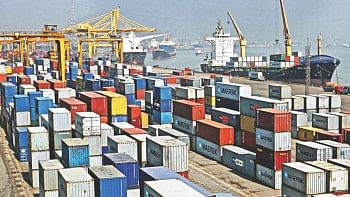Discord on power tariff baffles all
A minister and an adviser to the prime minister made news headlines on Monday by contradicting each other over a vital public issue -- whether the price of power will continue to rise over the next three years or not.
Finance Minister AMA Muhith at a press conference in Bidyut Bhaban on Sunday said power prices will have to be incrementally increased over the next three years to reduce the subsidy burden on the government.
Soon after Muhith left the conference, Energy Adviser to the Prime Minister Dr Tawfiq-e-Elahi asked the media not to take the finance minister literally. Dr Elahi said he disagreed with Muhith and that a tariff hike or reduction could not be predicted. He said power prices will be "adjusted" in future.
The contradictory comments left the audience, who saw several rounds of power tariff hike last year, confused.
What is actually happening? What did the energy adviser mean by adjustment of the tariff? Who should the media believe? If the energy adviser says his senior policy maker colleague should not be taken literally, is he not conveying to the public his no-confidence on him? Could he not clarify the matter with the minister privately before Muhith left the conference -- so that Muhith could correct himself if there was any mistake on his part?
The finance minister intensified the confusion further by stating that the latest hike was not caused by rental power plants.
But Bangladesh Energy Regulatory Commission (Berc) increased power tariff several times last year in response to the government's appeals. The government's appeal to hike the power is so strong that Berc has agreed to increase the retail tariff again in February.
Since last year, the government has been seeking 15 percent power tariff hike every six months for the next three years, with the view to increase the bulk rate to Tk 4.8 per unit from the present level of around Tk 3. Why?
Because due to the government's policy of fuel oil based rental power project as a quick solution to the country's power crisis, the country's fuel oil import has doubled. This has also pushed up power generation cost from Tk 2.5 per unit of 2009 to Tk 4.8 per unit now. As a result, if the power tariff is not increased, Power Development Board (PDB) will need Tk 9,000 crore subsidy this year. Such a huge subsidy is eating up the government's coffer.
Therefore, indeed the rental power plants have pushed up the power tariff and that needs to be addressed. The finance minister was right in saying that over the next three years, tariff will have to be increased. He was wrong in saying that rental power did not cause the tariff hike.
The energy adviser confused the audience by emphasising on "adjustment" of price -- which implies that the tariff could be reduced. In the history of Bangladesh, the only tariff of any energy product ever reduced was the price of petroleum. Petroleum is an imported product. In recent decades, its price sometimes went below 20 US dollars and shot up beyond 130 dollars a barrel. Adjusting petroleum price is therefore a rational approach.
But it is not the same with power tariff. The country's power is largely generated by natural gas. In recent years, the government turned to rental power projects using imported fuel oil due to a gas crisis. These fuel oil based rental plants have signed three to five years contracts. Their asking price for power generation is higher than that of conventional plants. So if the fuel oil price on the international market falls drastically, the government will save a good amount in importing the fuel, but will still pay high cost for the rental plants.
Besides, installing a power plant has become much costlier than the nineties and thus affecting power generation cost. The devaluation of taka is another killer factor in this regard.
Side by side, the government is also increasing gas price. With this increase, the input cost for power generation is being directly affected.
With these facts in place, it is highly unlikely that within two-three years, the government will have any scope to reduce power price. If within this period the government can reach a comfort zone, it could just stop increasing the price for a while.
This situation is well known to both the adviser and the minister. But their open disagreement neither helps the reality nor informs the public, nor does it give a good impression about what an adviser to the PM thinks of a minister.

 For all latest news, follow The Daily Star's Google News channel.
For all latest news, follow The Daily Star's Google News channel. 



Comments